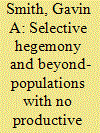| Srl | Item |
| 1 |
ID:
120630


|
|
|
|
|
| Publication |
2013.
|
| Summary/Abstract |
Over the past two decades, global market finance has taken root in China to seek property investment. This article examines the spatialities and anchorage methods of finance capital within Chinese national territory. It highlights the spatial and sectoral differences in the composition of property portfolios as a function of the return/risk coupling. These differences are exacerbated by a split in the geographical origin of the funds, which determines differentiated conditions of access to land and management of the investment time horizon of the assets portfolios. The penetration of finance capital into urban space tends to increase the fragmentation and functional specialisation of districts, a phenomenon fostered by entrepreneurial urban policies. As a result, urban projects are becoming standardised in terms of both design and program. They are increasingly governed by external references that favour the expansion of multinationals and transform lifestyles and consumer habits.
|
|
|
|
|
|
|
|
|
|
|
|
|
|
|
|
| 2 |
ID:
109159


|
|
|
|
|
| Publication |
2011.
|
| Summary/Abstract |
It's a commonplace that Federal Reserve chairman Ben Bernanke draws his policies from Milton Friedman and Anna Schwartz's A Monetary History of the United States (MH). With that in mind, this article establishes five points. First, contrary to conventional wisdom, Friedman and Schwartz merely insinuate their claim the Fed caused the Depression in MH. Second, their criticisms of Fed policy during the Depression, which turn on its refusal to adopt open market purchases (OMPs), repudiate Friedman's famed libertarianism and market fundamentalism. Third, Friedman and Schwartz don't refute the practical objections of bankers who opposed OMPs in the 1930s. Consequently, Bernanke's policies for addressing the financial crisis risk doing precisely what Friedman's targets warned against-encouraging financial speculation without addressing problems of unemployment. Fourth, Friedman and Schwartz's prescriptions entail a neoliberal, not a libertarian, state, one governed by technocrats and answerable to financial markets. Finally, what accounts for and unifies Friedman's contradictions is the beneficiary-finance.
|
|
|
|
|
|
|
|
|
|
|
|
|
|
|
|
| 3 |
ID:
109965


|
|
|
|
|
| Publication |
2011.
|
| Summary/Abstract |
A significant shift in the form of the political economy since the 1980s is frequently described as a shift from the welfare state to neoliberalism, the latter either referring to new principles of rule or more broadly to include the nature of the economy. The paper argues that it is more fruitful to explore how these changes reflected a shift in the dominance of forms of capital-principally from production to finance. The dominant class blocs in the former period pursued hegemonic projects described here as expansive; in the latter period such projects became selective. Insofar as finance capital seeks security through diversification (benefitting from difference) and is not itself productive of value, so it relies on and [re-]producesrespectively, a) selected populations invested in distinctions, and b) an absolute residual population. The politics of the former is one of negotiation, of the latter counter-politics beyond negotiation. Exploration of this difference becomes a crucial task for social analysis.
|
|
|
|
|
|
|
|
|
|
|
|
|
|
|
|